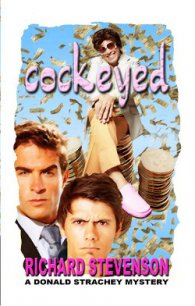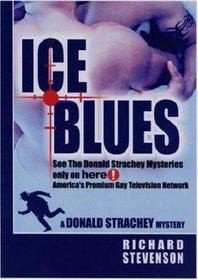A Shock to the System - Stevenson Richard (читать книги онлайн без регистрации TXT) 📗
He had a suite in a sixties-suburban business block off Western Avenue near the Stuyvesant Plaza shopping center. His listing on the building's directory just read "Vernon T. Crockwell, Psychologist, Suite 508." I took the elevator up and found a door with a sign that gave Crockwell's name and said "Enter Here." The fluorescent-lit, windowless waiting room had a blue couch and two blue chairs with a shiny washable finish and a table stacked with old copies of People. Crockwell apparently figured there would be plenty of opportunity in the rooms beyond this one for overstimulation.
On the wall opposite the couch, a mirror was mounted. I stood before it and carefully mouthed the words "You're pretty fucking intrusive, Vernon," and within seconds a door opened behind me.
"You are Donald Strachey?"
"Yes—Mr. Crockwell? Or is it Dr. Crockwell?"
"Please follow me, Donald."
He didn't look like Bela Lugosi, but he'd never have passed for John Denver either. He was tall and fiftyish and grave, with a
narrow, lined face, a beak of a proboscis, and what I sensed was a lot of muscle tension. He looked as if a good neck rub might have improved his outlook, but I didn't offer him one.
Crockwell led me on a brisk, wordless hike along a corridor past three closed doors and one that was open. I caught a glimpse of a big sunlit room with a dozen or so plastic chairs arranged in a circle. I followed him around a bend and noted that the nearly bald spot on the back of his straw-colored-turning-gray hair was bigger than mine but smaller than Timmy's. Crockwell's brown sport coat was wrinkled in the back, a sign of an important man who sat in a chair.
"Sit down, Donald," he said in his stern, avuncular way, indicating where I should do it. Behind a broad, uncluttered fake-mahogany desk, Crockwell manhandled a black leather swivel chair into position and lowered himself into it. The bookshelves on the wall behind him were crammed with clinical texts published by companies like Uplift House and the Yolanda Schnell Foundation for Sexual Normalcy. Leaning on one shelf was a framed degree, or diploma, with Crockwell's name on it from the North American Psychosexual Institute of Moline, Illinois.
To Crockwell's right was a window overlooking the shopping center. The window was shut, probably unopenable except with a wrecking ball, though the odor of deep-fried chicken nuggets had permeated the suite from somewhere below and hung in the still air. It seemed an unlikely atmosphere for considering people's sexual appetites, or any other kind. But that could have been the point.
"Now I want you to tell me, Donald," Crockwell said, as if he were the school principal and I had been sent to his office, "who it is you represent in your investigation of Paul Haig's suicide. Are you working for a member of Paul's family, Donald?"
"I'm sorry, Vernon, but I can't tell you that," I said, and he peered at me stonily. "But what I can tell you, Vernon, is that I've spoken with two people independently who knew Paul quite well and doubt that he committed suicide. He seemed to have been anxious over some work problems a little earlier, but he'd
been on an antidepressant for several weeks before his death and by at least two accounts was feeling relatively chipper. The coroner's verdict appears to have been the result of a too cursory, perhaps even slipshod, investigation."
"I see, I see." He screwed up his face and shifted uneasily.
"And since Paul was a client of yours, Vernon, it seemed to make sense for me to cover all the bases and get your input on his emotional makeup, if you wouldn't mind helping me out on this. Paul was your client as recently as eight months ago, I'm told. I realize that patient-therapist confidentiality is sacrosanct in your profession, Vernon. I respect that. It's important in mine too. But since Paul is deceased, would it be possible for you to contribute to my investigation of his death by revealing to me the nature of the mental problems that first brought Paul to you as a client?"
It occurred to me as I said this that it wasn't just morbid curiosity that had brought me to Crockwell, or any real hope that he might immediately shed light on Paul Haig's death; what I most wanted was to poke at Crockwell with a stick and see if he'd try to snap off my leg with his powerful jaws. He didn't, but he bristled a little, and said, "If you're an investigator worth your salt, Donald, I'm sure you know perfectly well why Paul Haig was my patient. I work with the sexually dysfunctional."
"You mean gay people."
"Yes."
"And Paul had come to be de-queered."
"Made whole, brought into sync with nature, yes. Please don't bait me, Donald. It was no trouble for me to find out that in addition to being a private investigator you are a well-known gay libber around Albany. If you would like my opinion on Paul's emotional state as it might relate to his death, I will give it to you. But I'm not going to waste my time and yours debating aspects of the human personality you obviously know nothing about." He sat looking smug, though not quite 100 percent certain I wouldn't lunge at him. He kept one hand out of sight at all times below the desk—though if he had an alarm button down there, or a firearm,
or a little squeeze toy that might suddenly go "Fuh-wee-too, fuh-wee-too," I had no way of knowing.
I said, "It is Paul Haig's death I'd like your views on, Vernon, but I want you to realize that I am quite willing to be convinced that I am a freak of nature. I always try to keep an open mind about that. Do you have scientific studies showing that your theories are correct and the results of your therapy beneficial?"
Still keeping his hand out of sight, Crockwell said, "Yes, innumerable studies have been completed, Donald. And the human testimony is voluminous and incontrovertible. Tens of thousands of formerly sexually damaged men and women who have found wholeness and fulfillment through therapies such as mine have even organized socially and politically. They call themselves the ex-gay movement. I'm sure a man of the world like yourself, Donald, must have heard of it."
"Yes, I've heard about 'ex-gays,' Vernon. I've also read about the ex-ex-gay movement, made up of people who claim therapy such as yours is a pathetic snare and a delusion. They say ex-gays are people who live out their lives and try to behave in a way that denies their deepest and truest natures, and that people who remain in the ex-gay movement are either vegetables or liars."
Crockwell had undoubtedly heard all this before and appeared unfazed by it, though still cautious enough to keep his trigger finger poised. He said, "I have no need, Donald, to debate this matter further with you. You claim to have an open mind, but it's obvious that you do not. I would like to point out to you, however, that nature does not produce homosexuals. Why would it? Nature produces heterosexual males and females capable of mating and with an impulse to do so. In the sexual maturation process, something goes awry in some people. But this unnatural sexuality can be corrected. Are you old enough, Donald, to remember the song 'A-doin' a-what comes naturally'?"
I looked at him, not sure I was hearing what I was hearing. I said, "I've heard it. It's from Annie Get Your Gun."
He said nothing more, just looked at me as if he had delivered the clincher in his argument and it would be foolhardy of me to
attempt any reply. I said, "Vernon, I've heard of psychologists going to Freud for their theoretical underpinnings, or to Adler or Sullivan or Erik Erikson. But Irving Berlin? This is a first."




